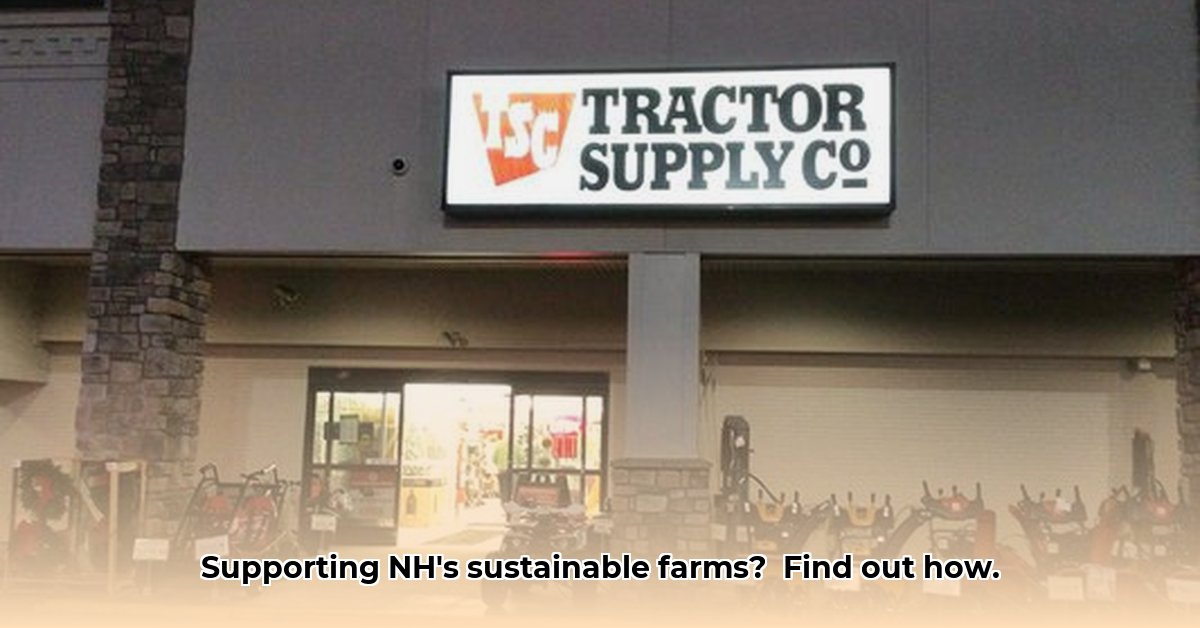
How Tractor Supply Indirectly Fuels Sustainable Agriculture in New Hampshire
Tractor Supply Company (TSC) in Derry, New Hampshire, isn't a farm, but its impact on sustainable agriculture in the region is surprisingly significant. This isn't about overt eco-marketing; it's about the quiet, everyday contribution of a readily accessible supplier of essential farming and gardening goods. How does a big-box retailer influence sustainable practices on a local level? The answer lies in convenience, community, and the ripple effects of seemingly small choices. For example, check out this information on rye grass seed availability.
How does convenient access to supplies directly influence sustainable farming? One key factor is the simple accessibility of essential tools, feeds, and materials. Imagine a farmer needing specialized fencing wire or organic seeds. The time and effort saved by obtaining these items locally at TSC frees up valuable resources for other critical sustainable farming practices, such as water conservation or crop rotation. This convenience, often overlooked, is a significant driver of efficiency and ultimately, sustainability. Isn't efficient resource management the cornerstone of sustainable agriculture?
Beyond the basics, however, lies a wider influence. The pet food aisle, for instance, features products with locally sourced ingredients—a small detail with environmental consequences. Reducing the demand for less sustainable, factory-farmed animal products, even indirectly, contributes to a more responsible food system. This highlights how seemingly unrelated choices can create positive environmental ripple effects, a nuanced aspect of TSC’s contribution. Have you considered the indirect environmental benefits of even the pet food section?
TSC also serves as an informal community hub. Farmers, gardeners, and even pet owners exchange ideas and best practices, often discussing sustainable techniques. This informal knowledge sharing fosters a collective commitment to environmental responsibility—a grassroots movement enabled by a shared location. This organic collaboration highlights the surprising power of community building in promoting sustainability. Doesn't the exchange of practical knowledge within a community accelerate the adoption of sustainable practices?
Opportunities for Growth: Transparency and Direct Support
While TSC's current impact is undeniable, there's room for enhancement. Increased transparency regarding product sourcing and environmental impact would significantly bolster its message. Detailed information about the carbon footprint of supplies and the sustainability of the supply chain would empower customers to make informed choices and support businesses aligned with their values. Wouldn't clear information on a product's environmental impact influence consumer purchasing decisions?
A stronger partnership with certified sustainable local producers would further amplify TSC’s contribution. Imagine shelves stocked with locally sourced organic feed or compost. This would foster a synergistic relationship, directly linking the store to the success of local sustainable farms. Such a direct partnership would reinforce TSC’s commitment to supporting environmental responsibility. Wouldn't direct support for local sustainable producers amplify TSC’s positive impact exponentially?
Finally, educational initiatives like workshops on sustainable farming techniques or water conservation could further engage the community and strengthen the link between TSC and environmental responsibility. This would transform the store from a simple supplier into an active champion of local sustainable agriculture. Wouldn't focused educational programming empower local farmers to adopt even more sustainable practices?
Assessing TSC's Impact: A Multifaceted Approach
Key Takeaways:
- TSC's contribution to New Hampshire's sustainable agriculture is indirect yet significant, stemming primarily from its role as a readily accessible supplier.
- Assessing this impact requires a diverse approach evaluating sales data, farmer experiences, and comparison with competitor suppliers.
- The availability of sustainable products and educational resources at TSC directly contributes to environmentally conscious farming.
- The store's economic contribution to rural New Hampshire indirectly supports the long-term sustainability of the farming community.
To fully understand TSC’s impact requires a thorough examination across multiple areas: analyzing sales data for sustainable products, conducting farmer interviews to assess TSC’s influence on their daily operations, and conducting comparative market research to identify the retailer’s standing compared to its competitors. This multifaceted approach, incorporating both qualitative and quantitative data, allows for a nuanced and reliable assessment of TSC’s influence. Isn’t a holistic analysis essential for a comprehensive understanding of TSC's role?